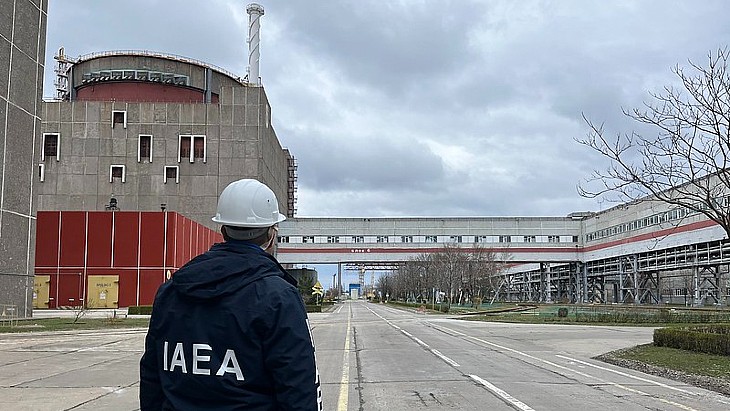International Atomic Energy Agency (IAEA) Director General Rafael Mariano Grossi says agreement on protecting the Zaporizhzhia nuclear power plant is needed urgently, saying "this situation cannot continue" after its link to external power supplies was lost for most of the morning on Monday and it was forced to rely on emergency diesel generators for a seventh occasion.

There have been IAEA staff present at the plant since September (Image: IAEA)
Writing on Twitter, Grossi called the nuclear safety situation at the plant "extremely vulnerable" and said "we must agree to protect plant now".
According to Ukrainian nuclear power plant operator Energoatom, at 05:26 local time on Monday the only operating 750kV high-voltage power transmission line was lost, which prompted the plant's fleet of emergency diesel generators to start-up to supply the power required for a variety of safety, cooling and control functions.
In an update on Energoatom's Telegram channel posted at 11:32, it reported that the power supply had been restored.
According to a report by the Russian Tass news agency: "It is specified that the radiation background on the nuclear plant’s premises, in the sanitary safety zone and the observation zone is normal."
The Zaporizhzhia nuclear power plant is Europe's largest, with six reactors. It has been under Russian military control since early March 2022, and is located on the current frontline between Russian and Ukrainian forces.
During the war it has suffered damage from shelling, with both sides blaming the other, and it has had its external power supply lost on six previous occasions. The IAEA's Grossi has spent months seeking to secure agreement for a safety zone around the plant. That proposal has now evolved, with Grossi saying: "It is very simple: don’t shoot at the plant and don’t use the plant as a military base. It should be in the interest of everyone to agree on a set of principles to protect the plant during the conflict."
There has been a team of IAEA experts present at Zaporizhzhia since last September, with members rotating after a few weeks at the plant, a process which sees them having to cross the military frontline. In an update on Friday, ahead of the latest loss of power, Grossi reaffirmed his concern for the welfare of staff at the plant, having to carry out their work surrounded by conflict, including shelling last week of the nearby town of Energodar.
He also highlighted concerns about the staffing numbers at the plant: "At the moment, it has enough staff for a plant whose reactors are all in a shutdown mode. It remains clearly insufficient, however, for carrying out necessary maintenance and other regular work. The longer the plant has this kind of reduced staffing, the bigger the nuclear safety and security risks become. The situation remains unsustainable."